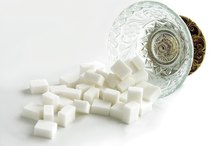Foods Known to Damage the Liver
The liver is one of your body’s vital organs and its main functions are to digest and store nutrients from your food and to help remove harmful substances from your blood. It is important that you monitor your intake of sodium, sugar, fat and alcohol to keep your liver healthy.
Reduce Your Sodium and Sugar Intake
A diet high in sugar and salt can be harmful to your liver and too much salt causes your body to retain fluid 2. The adequate intake of sodium for adults is 1,500 milligrams a day, so it is important to read nutrition labels carefully to identify foods that have 300 milligrams of sodium or less per serving. A high-sugar diet also puts you at greater risk for obesity and for stress on your liver 2. Instead of eating simple carbohydrates such as cookies and donuts, choose complex carbohydrates such as whole-grains and fresh vegetables.
Limit Your Fat Intake
Foods That Are Bad for Your Liver
Learn More
Too much fat increases your risk of obesity and of non-alcoholic fatty liver disease. You should get no more than 20 to 35 percent of your total daily calories from fat, according to the Dietary Guidelines for Americans 2010. More specifically, reduce your saturated fat intake to less than 7 percent of your total calories and eliminate your trans fat intake. Foods such as margarine, cookies and high-fat meats contain unhealthy fats.
- Too much fat increases your risk of obesity and of non-alcoholic fatty liver disease.
- More specifically, reduce your saturated fat intake to less than 7 percent of your total calories and eliminate your trans fat intake.
Related Articles
References
- American Dietetic Association: Cirrhosis Nutrition Therapy
- National Institute of Diabetes and Digestive and Kidney Disease. What Is NAFLD and NASH?
- National Institute of Diabetes and Digestive and Kidney Disease. What Is NAFLD and NASH?
- National Institute of Diabetes and Digestive and Kidney Disease. How Can My Diet Help Prevent or Treat NAFLD or NASH?
- US National Library of Medicine. Medline Plus. Fatty Liver Disease.
Writer Bio
Stacey Phillips is a registered dietitian and nutrition writer. She has had articles and patient information handouts published in the "Renal Nutrition Forum" and the "Journal of Renal Nutrition." She holds a Bachelor's degree from the University of Illinois in Champaign-Urbana and a Masters degree at Central Michigan University.









